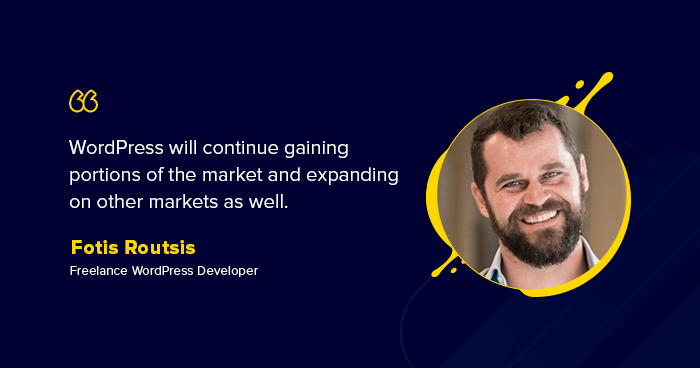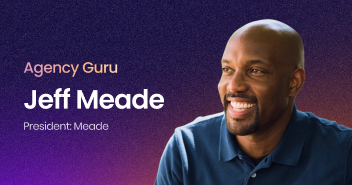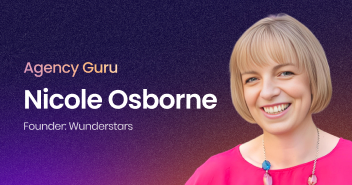
We have today Fotis Routsis all the way from Greece to speak with us on how he got into WordPress and the amazing journey that he has been on since.
Fotis is a freelance developer, a WordCamp organizer currently busy organizing WordCamp Greece 2021. He is also a WordPress plugin translator and has spoken at many WordCamps.
Let’s hear it from Fotis!
Moeez: Hi Fotis, it’s great to have you with us today. We would love it if you introduce yourself to our audience. Tell us a little bit about your background and what you are working on nowadays?
Fotis: Thank you very much for having me here with you! I am Fotis Routsis (aka Fotaras), a WordPress developer currently based in Athens, Greece. I have studied Informatics at “Athens University of Economics and Business” and hold an MSc in Health Informatics.
I have been around computers since I was a kid. Not a great hacker, but I feel comfortable around computers. I have been working as a freelancer during my entire career so I find it difficult to follow the routine of commuting to work every day. I have been working from home, remote beaches, cafes, hotels during my escapes as a (wannabe) digital nomad. I consider myself a workaholic, a topic on which I need to improve upon. Nonetheless, in my free time, I love being close to or in the sea. I have been scuba diving for the past few years and I totally love it.
Moeez: How did you start working with WordPress? What led you to think that WordPress should be a part of your career?
Fotis: In my early days as a developer, I had to work with websites and I ended up choosing WordPress. The choice was more of a lucky approach. I was still a newbie and needed a not-so-complex way of completing my projects.
While working on those projects, I realized the power of WordPress and after a few years, I got to know the big community behind it. I consider myself a FOSS advocate and WordPress and its community are some of the best examples out there. I will stick around WordPress (hopefully) for many years to come. The ecosystem around it is huge and it keeps expanding.
Moeez: As a WordPress contributor, what is your basic source of income? What projects do you work on regularly?
Fotis: Although I am a full stack developer I prefer more backend stuff. I mostly work with PHP, and when needed, add the required ingredients (JS, CSS, HTML). I have managed to utilize WordPress in a variety of projects from basic websites to ecommerce solutions to headless CMS for apps.
Moving WordPress outside its “traditional usage” is my favorite thing to do. Incorporating external APIs and creating advanced flows for content management is mostly what I deal with (or would like to deal with) at most of my projects. So yes, I would prefer the tag of a Backend Developer!
Moeez: Speaking of WordPress as a career, how did you get involved in the WordPress community? And how long have you been a part of it?
Fotis: Back in 2013, I discovered the Greek WordPress Community. I was not that active at the moment but was just an observer monitoring the channels etc. The next year, I realized there was an event called WordCamp Europe in Sofia. It was the second of its kind and I participated as a volunteer. The fun fact is that during that event, I got to meet many members of the Greek community.
Being part of such a team, even as a volunteer made me realize the strong connections and the participatory character of the WordPress family and made me want to be a more active member.
I have been participating in any way I can from attending (yes I consider attending a great first step) speaking, volunteering, and organizing from local meetups and WordCamps to WordCamp EU. Currently, I am also the Lead Org in the WordCamp Greece 2021.
Moeez: I see that you are the team lead for WordCamp Europe this time around. Can you share the best experiences from WordCamps?
Fotis: I have been part of the organization team in the past years as well. It has been a fun ride every time!
Unfortunately, it is hard for me to pick experiences from WordCamps. Being able to contribute as an organizer allows you to get involved deeply with other members from across Europe and create strong bonds. Each and every one of us can’t wait to attend the live event in the summer.
Most of us will be there a few days earlier and after the main event and will catch up during lunch, dinner, or drinks. These few days are like mini-vacations for me. But if I were to pick a moment that would be the final day where all organizers, volunteers, and attendees gather at the big hall. It is the moment that you realize the impact of what you have achieved during the past few months.
Also, let’s not forget the afterparty. 😛
Moeez: Coming back to WordPress, why do you think WordPress is so popular considering it now powers around 40 percent of the web? What is that cutting edge that WordPress has and other platforms don’t?
Fotis: It is far too easy to answer that. There are few things that have allowed WordPress to gain 40 percent of the web. The most important is the ease of use. Using WordPress as a content editor is very simple and I can personally say that this was the major reason why I first selected WordPress.
Furthermore, there is a huge number of solutions (plugins, themes, and services) out there and an ecosystem of great individuals and companies supporting WordPress. It is very safe to say that you will always find support or someone to take over your project by implementing it or improving it.
Also, one has to acknowledge great companies, like Cloudways, offering WordPress-specific hosting. It is easy to understand that by combining all the above, one would feel confident to select WordPress for the next (or the first) project.
Moeez: What do you think is the future of WordPress? Is it going to gain the same success as it has over the years or is there a slump around the corner?
Fotis: I may be biased on this but I do not see any slumps around the corner. WordPress will continue gaining market share and expanding in other markets as well (ecommerce etc). WordPress keeps changing, evolving, and improving and this has been highly appreciated by the market with the consequent increase in the market share.
It is important for one to realize that WordPress can be used to build a simple site (with only one developer and low budget) to a highly complex large-scale enterprise application ( multiple developers, users, and budget in the thousands).
WordPress will continue to be the tool of choice for the years to come. Not many other solutions (maybe none) out there combine the power of Open Source with a large diverse and versatile community and a continuous user-centric roadmap. Gutenberg has been a major shift and, although many of us have not managed to get the full grip of it yet, it will reach out to more users and content creators.
Moeez: If you could instantly change one thing in WordPress, what would it be?
Fotis: It would be unfair to say nothing although that comes to mind as a first answer. In general, I do not see any major drawbacks. Anything you need, that is not available in the core, can be found in a plugin or service (free or premium).
A few years back I would have liked to have more security-related features but with the security auto-updates and the health check tools, things have become much better.
The one thing I believe is missing is a way of having a backup engine in the core functionality. Nothing fancy just a simple solution letting you know that we have your latest DB version and plugins safe.
Moeez: Keeping WordPress aside for a little bit, what do you think about remote working? Since almost everyone is working from home, what are some of the challenges you face with remote work?
Fotis: I have been a remote worker for my entire career. It is not easy for me to adjust and commute to work every day. I have been working from almost everywhere (I believe this is true to most of the devs out there) and especially from home for many years.
One thing to note is that this way of working is not for everyone, for instance, for people who live in a small apartment and have children. I am not a life/work coach but here are few tips:
- Set up a workspace (if possible). Even a corner with a small desk would fit. Working on the couch or the bed should be avoided.
- Set up a schedule. It is far too easy to “keep working” when you work from home.
- Dress up. Pijamas are good only for sleep.
- Take regular breaks, as you would do in an office. Being at the office, you get up way too often than when you are at home.
- Kill the distractions. When moving from office to home, the teammates (or supervisors) tend to overuse (or one could say abuse) chats and virtual meetings. Try to gain control over these aspects of your routine and your performance will drop significantly.
- Finally, do not feel like you are not working. Many people who shifted from office to home (many were forced to do so due to COVID) have faced psychological pressure when they are either being treated like they do not work enough (pressure coming from supervisors or teammates) or they tend to feel themselves that way (self-pressure). I can assure you that anyone with a good work ethic produces much more work than when being at the office.
One last thing I would like to mention is that companies who were not ready for this shift tend to have more problems. They did not come up with any plan to organize the new way of remote working and they end up putting pressure on their employees. Companies should set up and (keep improving on) a plan for their new way of work.
Moeez: Online or virtual events are replacing offline events and it seems like this year the story won’t change much. How has your experience been organizing and attending online events? Are they a good substitute for offline events?
Fotis: Like all of us I have turned to attend online events since the offline ones are out of reach. We had to cancel our own WordCamp Athens after postponing it. Needless to say, WordCamps are the heart of the WordPress community. As I mentioned previously, I am part of the organization team of the WordCamp Greece 2021 where we are trying to bring the community close through the online event.
I would not like to compare online and in-person (live) events. The latter is definitely the way to go. To form connections and to expand as a community, you need to allow people to interact with each other. Online events do not allow that. We sit in the same chair that we work all day and we are just listeners but in an in-person event we get to see other people, interact with them, ask questions, exchange opinions, have fun and switch off the work mode.
Many, especially young, people have been asking me about my career and what has helped me advance so far. The main answer is “attending events”. I know it sounds ridiculous but for me, it has been a game-changer. You get to know other people, who have done what you are trying to do, you get to fight with your imposter syndrome, you get to shake hands with people who own and run “multi-million” companies and you realize that you are part of the same ecosystem and that you can also be like them. Evolution through participation is a good motto and live events are the way to allow that.
The COVID situation has caused the cancellation of all the live events but we are still trying to participate via online meetups and WordCamps. It is worth struggling with these ways of communication prior to meeting again during live events.
Moeez: Lastly Fotis, what advice would you like to give to people choosing WordPress as their career? What are some of the things they need to look out for?
Fotis: I will not be innovative or super motivated here. There is a simple recipe in my opinion. Start humble, evolve, be honest, work hard and work smart.
- Start humble. Fight your imposter syndrome but kill your god syndrome. Learn from others, they always have something to give.
- Evolve. HTML with CSS to PHP to JQuery to React and back to PHP. It is a never-ending path and you need to be willing to walk it. Do not get me wrong, you cannot excel at everything but having a good understanding of the WordPress stack is a must. The least you can do is know what is out there and scratch the surface of it. Why not write “Hello World” in HTML, PHP, React, jQuery, Vue, Bash, etc.
- Be honest. My sites have been hacked, my work has been sloppy, my estimates have been off. Acknowledge the fact that the above will happen and happen to all of us. Explain that to your client/teammate/coworker. Do not blame others for what you have control over. It might be difficult to do so but explaining why you have failed in something can also be liberating and create stronger bonds with the other side.
- Work hard. Yes, at the beginning you need to work hard, you need to work really hard. Nothing comes easy. Build a theme or improve one – rewrite it, break functionality into plugins, write shortcodes, write Gutenberg blocks, rewrite them, improve them. No need to do huge improvements but apply new things you learn. There will be a lot of unpaid work since your estimations will be off but you will learn to estimate better next time.
- Work smart. You need to learn to work smart. Be adaptive. Sometimes you will need to choose the least optimal way of doing things due to time, budget, or resource limitations. Know when to do that and adapt to the needs. You will need to learn that in the market out there a top quality is the ability to deliver, and you should be able to do that.
Mohammed Moeez
Moeez is a WordPress community manager at Cloudways. He loves to work closely with customers to understand their problems and come up with solutions that are not only beneficial but are long lasting as well. He also actively participates in the community to share his knowledge regarding Cloudways and hosting in general. In his free time he likes to watch football, workout and spend time on his PlayStation. Get in touch with him at [email protected]


